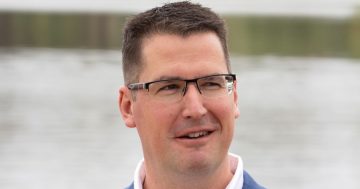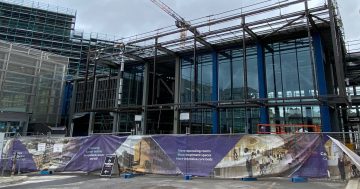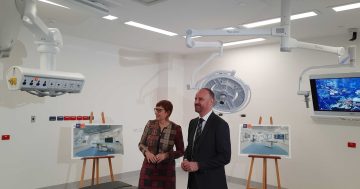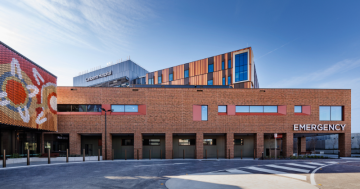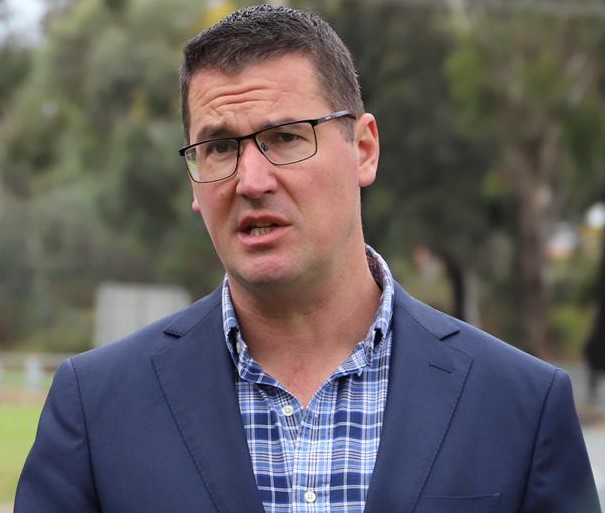
Zed Seselja says the Morrison government has made the biggest investment in Canberra since self-government. Photo: Cassandra Choake.
ACT Liberal Senator Zed Seselja has told a Clubs ACT and Australian Hoteliers Association election debate that the Morrison Government is responsible for “the largest infrastructure spend in Canberra in a generation, the largest since self-government”, worth $2.2 billion.
Senator Seselja argued that the Coalition government had spent a record sum via health, education and housing initiatives, although many of these measures are nationally applicable. He also pointed to the recently announced funding for the AIS.
“This government has been delivering for our city,” he said.
“We’ve doubled health funding, more than doubled in fact. Health funding in the ACT was around $202 million per annum when we came to office. This year, it’s over $500 million, well ahead of inflation.
“We’re investing in our hospitals. Education funding is also at record levels. Here in the ACT, I’ve also recently been pleased to be able to deliver funding for the AIS arena to be fixed and reopened.
“I’m fighting for important projects like Viking Park because I think that is something that would be a great thing for the city, and indeed, will be a collaboration with one of our great clubs on the south side of Canberra.”
But when challenged by industry stakeholders about whether Canberra had been forgotten by the Commonwealth, Senator Seselja had fewer answers about the impact of lockdowns and the critical staff shortages faced by the local hospitality industry.
Industry stalwarts say that skills shortages are making it almost impossible for many venues to operate with certainty, even if skilled migration returns post-pandemic.
They say lockdowns have exacerbated an already critical situation in the industry, pointing to the fact that cooks and other essential staff don’t necessarily have access to permanent visas. Audience members noted that Canberra’s 3.4 per cent unemployment rate may be too low for businesses to actually secure staff.
Member for Bean David Smith articulated the challenges faced by the hospitality sector, laying blame at the feet of what he said was a poorly managed Federal vaccine rollout and a failure to invest in the rapid antigen tests that would allow venues to re-open.
“We all suffered as a result of this,” Mr Smith said.
“For the first time in nearly 30 years, more than one million people were stood down in this sector during the first few months of the pandemic.
“More Australians are at risk of being left out and left behind as a result of the Morrison government’s inaction and ineptitude.”

Labor’s David Smith says Canberra’s hospitality sector was hit particularly hard by lockdowns. Photo: File.
Mr Smith said that the lockdown’s impact had been felt particularly strongly in the hospitality sector.
“I understand that in [2020] there was a 30 per cent downturn or a billion dollars loss in bar sales,” Mr Smith said.
“And with every closure, a social connection was either severed or left hanging by a thread. So many Canberrans and their families get critical community connection through your businesses.
“The sector here has worked to provide ongoing support for their workforces, despite the significant financial consequences of pandemic restrictions. There’s been some extraordinary work in terms of partnerships of charities to provide support to those Canberrans most in need.”
Senator Seselja also nominated housing as a critical concern in the ACT, pointing to his advocacy on land in West Tuggeranong that, he says, will deliver up to 6000 blocks if the ACT Government agrees to release it and unused CSIRO and Commonwealth blocks.
He said that due to his intervention with housing minister Michael Sukkar, the ACT had the biggest increase of any state or territory to thresholds for the home guarantee, now $750,000 in Canberra.
Flagging the government’s temporary fuel excise cut, and boosts to defence and infrastructure spending, Senator Seselja said he had been “personally fighting for Canberra businesses”.
Mr Smith said that on many measures, he and Senator Seselja had worked together as co-convenors of the parliamentary friends of the national capital.
“A common message that I’m hearing is that constituents are looking for a moment of unity now where people can work together, not apart. People are not looking for the politics of division. We want governments that can work together rather than being at each other’s throats”, he said.
“That still leaves room for healthy criticism and challenge”.












